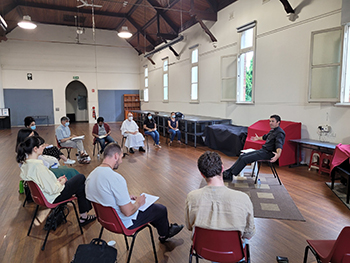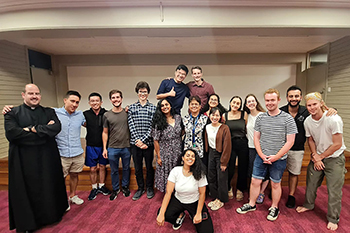In the December 2022 edition of The Bridge, we examined the ministry of university chaplaincy, highlighting some of the challenges and joys experienced by university chaplains in secular, Catholic, regional and urban settings. In this article, we explore the support structures in place for Catholic university chaplains and how the Church in Australia can best nourish this important ministry.
****************************
Historically, university chaplaincy has been somewhat of a “grey area” in Australia, when it comes to support, training and coordination. In some instances, the Catholic university chaplain is an employee of the relevant local diocese; at other times, he or she is employed by the university or perhaps the chaplain is simply a volunteer.
As such, there is no overarching body, group or organisation responsible for guiding and supporting Catholic university chaplains.
“University chaplaincy is most often simply conflated with youth or young adult ministry,” says Tom Gourlay, the national director of chaplaincy and faith formation at the University of Notre Dame Australia (UNDA).
“There are, of course, similarities, but there are complexities in the university context that deserve careful attention.”
Some of these complexities include the increased number of mature-age university students and the growing number of online courses and classrooms, meaning that traditional young adult strategies no longer meet the needs of university chaplaincy.
“I would like to see a more concerted effort to empower and upskill lay people and clergy (religious or diocesan) in this important, but rather complex, area,” Mr Gourlay says.
Training, resources and support are a particular need in smaller, regional universities, as Catholic chaplain at the University of Newcastle Mary-Anne Deluca can attest to.
“There’s not an abundance of that information, so any more resources in that area is a positive,” she says.
Even in a Catholic university like UNDA, there is a need for fresh, relevant formation and training that is suited to the modern tertiary education setting.
“The most recent formal episcopal guidance on university ministry that any English-language bishops have given was one from the National Catholic Conference of Bishops, precursor to the United States Conference of Catholic Bishops, called Empowered by the Spirit, published in 1985,” Mr Gourlay says.
“It is a very useful document, but the context that it was written for is vastly different from what confronts us today.”
A national resource on university chaplaincy that provides some guidance for the ministry would be welcomed, according to Mr Gourlay.
Additionally, while those involved in chaplaincy don’t believe there is a need for national coordination of Catholic university chaplains in Australia, some believe a national network would be a good starting place.
Over the past few years, Catholic university chaplains have started to informally discuss ways they can work more closely together, Mr Gourlay says.
“This culminated last year with a meeting on Zoom of all those around the country involved in university chaplaincy or campus ministry,” he says.
Ms Deluca says there would be numerous benefits if chaplains were to gather regularly to share experiences and resources, to discuss research and insights into best practices, and to provide mentoring and guidance for new chaplains.
“It's kind of a niche area, so to be able to share what you’re doing, what’s working and what’s not working, would be so valuable,” she said.
Former Sydney-based university chaplain Tony Mattar has no doubt that a national network would be a major boost to the ministry.
“I’ll get a call probably once every two weeks from a new chaplain … and they say ‘we need resources, we need tips, how did you do it? How does it work?’, so absolutely a national network needs to be set up,” he says.
At the diocesan level, Sydney and Melbourne have led the way in terms of providing support and training for their university chaplains locally.
Karina Bohorquez, chaplain at the University of New South Wales, says the Archdiocese of Sydney has invested a lot of time and resources into its chaplaincy program.
 “The Archdiocese of Sydney has four secular chaplaincies at four secular universities, and we work under something that is called University Catholics,” she explains.
“The Archdiocese of Sydney has four secular chaplaincies at four secular universities, and we work under something that is called University Catholics,” she explains.
“We come together to have formation sessions, and we do some collaborative events together with all of the people from the different chaplaincies.
“But each of us are independent from one another, so we run our own events, but we also collaborate. I think that works really well.”
Similarly, the Archdiocese of Melbourne has begun to re-organise its efforts in the chaplaincy space, under the direction of Fr Nicholas Pearce, senior chaplain for youth, young adults and campus ministry and deputy director of the Proclaim Office for Mission Renewal in the Archdiocese of Melbourne.
“After a long time of our university chaplaincy really working in isolation from the diocese, we now work in a concerted effort in the areas of youth, young adults and campus ministry,” Fr Nicholas explains.
“So rather than the work of university chaplaincy being an isolated ministry, it’s now part of our overall approach to engaging with young people and then to engage young people in the work of discipleship and making disciples of their peers.”
 In a similar approach to the Archdiocese of Sydney, Fr Nicholas says university chaplains in Melbourne are no longer simply “doing their own thing” at their respective campuses.
In a similar approach to the Archdiocese of Sydney, Fr Nicholas says university chaplains in Melbourne are no longer simply “doing their own thing” at their respective campuses.
“We’re now trying to operate on all campuses with a much more unified approach, so that each individual chaplain feels a lot more supported,” he says.
“We’ve got priest chaplains on each campus and now we have two full-time discipleship officers for universities who support all of our campuses. They’re primarily based at two campuses, but they provide resources and support to the other campuses as well.
“We’ve got online programs, we’ve got a podcast now, we do a weekly newsletter… it’s about the discipleship team of the Archdiocese providing a whole variety of resources and support to our chaplains on each one of their campuses.
“It’s been really interesting to see in the last 12 to 18 months in Melbourne, where we’ve put a greater emphasis on our university ministry, to see some really great fruits already,” he says.
“I think the young adult and university space sometimes gets a little neglected, and I think it’s an incredibly important time in the lives of young people and the Church should be taking a more active role in it.”
Images: Chaplaincy staff from the four secular universities in the Archdiocese of Sydney gather at the start of 2022 for formation led by Fr Daniel McCaughan; Fr Nicholas Pearce with students from the University of Melbourne Catholic Society.
Words: Matthew Biddle



